Subscriptions
Once you add subscriptions to Fenerum we will send invoices and, if using payment cards, collect payments for you.
Overview
Understand how subscriptions are renewed
Everything about contracts, discount tiers, etc.
Detailed guide on forward/backward charging
In depth information on how to schedule changes on active subscriptions
Guide for importing historical data such as subscriptions, MRR, invoices, or transactions to Fenerum
Guide to manage and implement price changes (e.g., price increases) in Fenerum
Guide to manage and implement reseller in Fenerum
Creating a subscription
Before you begin
Before you begin the process, make sure you have the following:
- You have an active user on Fenerum with the necessary permissions to create subscriptions. You must either be an admin or have full access permission to billing.
- Customer information (name, address, email, payment details) is ready for use.
- You have set up plans and terms for the subscription type that will be linked to the customer.
1. Select customer
When creating a subscription, you must first select which customer the subscription will be linked to. This can be done by searching for the customer's name or email in the search field. If the customer doesn't already exist in the system, you need to create a new customer.
You create a new customer as follows:
Go to billing – accounts

Click on +Add account

Fill in the basic data. Start by selecting the country and if the customer is from Denmark or Norway, you can automatically retrieve data by searching in company register
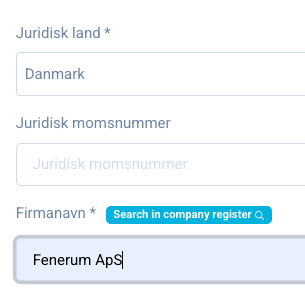
Then the CVR number, address, postal code, and city are filled in
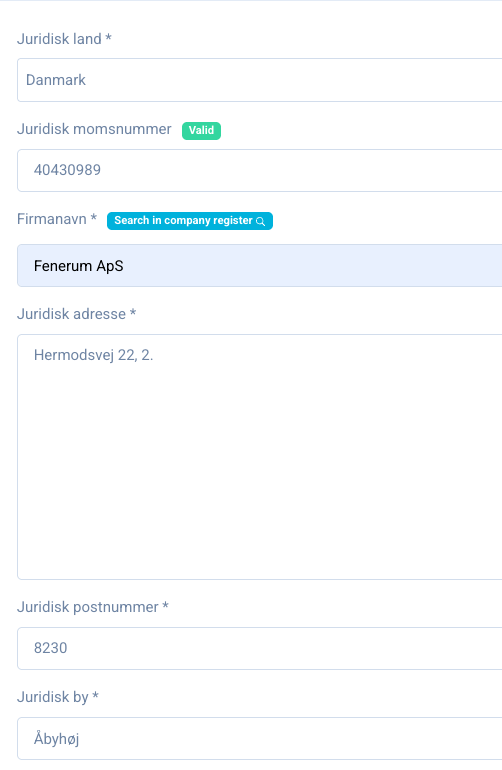
Select language (Important in your communication with the customer, as invoices and templates are language-versioned) and give the customer a unique ID
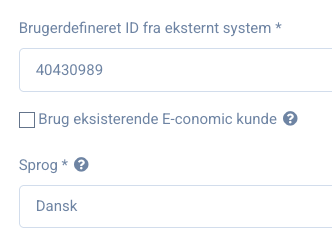
Then click SAVE and you're ready to create a subscription
2. Add payment information
If the subscription is to be charged with a payment card or Direct Debit, this information must be added to the customer before the subscription is created.
Payment with payment card
Payment with payment card requires that you have created a collection agreement.
You can see a setup guide for each of our integrations here
Payment with Direct Debit
Payment with Direct Debit requires that you have created a creditor agreement or have your existing agreement changed so that Fenerum is the data provider.
A guide to setting up and using Direct Debit can be found here
Payment information is added by clicking +Add payment method

Then select the integration, in this example, it is desired to charge payment with a payment card using Stripe as the collector
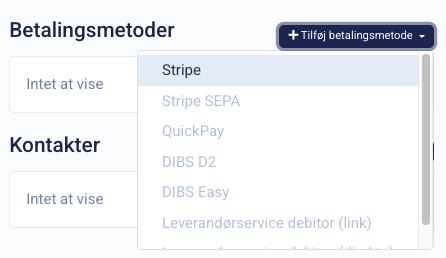
Then the following link can be sent to the customer
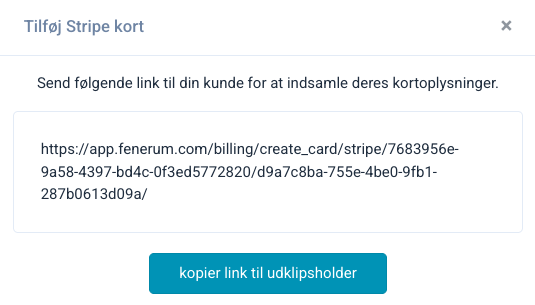
3. Add invoice recipient
Before a subscription is created, it is important that an invoice recipient is added.
This is done by going to contacts - +Add contact

Add name, email, and mark receive invoice. If the customer is on an automatic payment solution, receive payment confirmation should be activated, and if the customer is charged with a payment card, then receive payment card notification should be activated, so Fenerum automatically sends a message to the customer 30 days before the card expires.
When SAVE is clicked, the invoice recipient is registered.
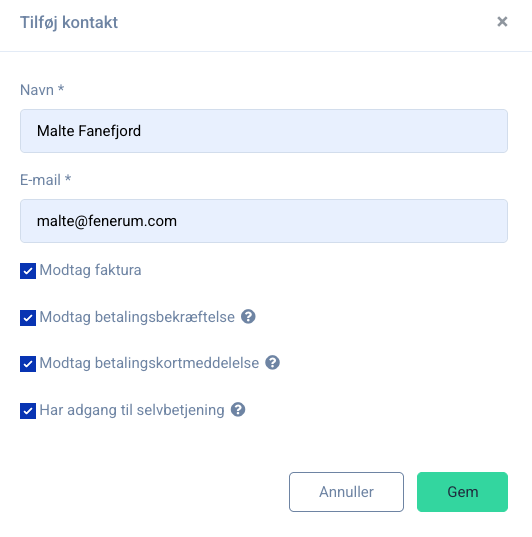
4. Setting up discounts
If the subscription is to include a discount, it is important that this is created before the subscription starts.
A guide to setting up discounts can be found here
5. Creating the subscription
Go to subscriptions (Top of the customer page) and click on +Add subscription
Fill in the following standard information:
- Plan selection
- Billing frequency
- Price
- Payment method
- Quantity to be billed
- Due date
- Start date
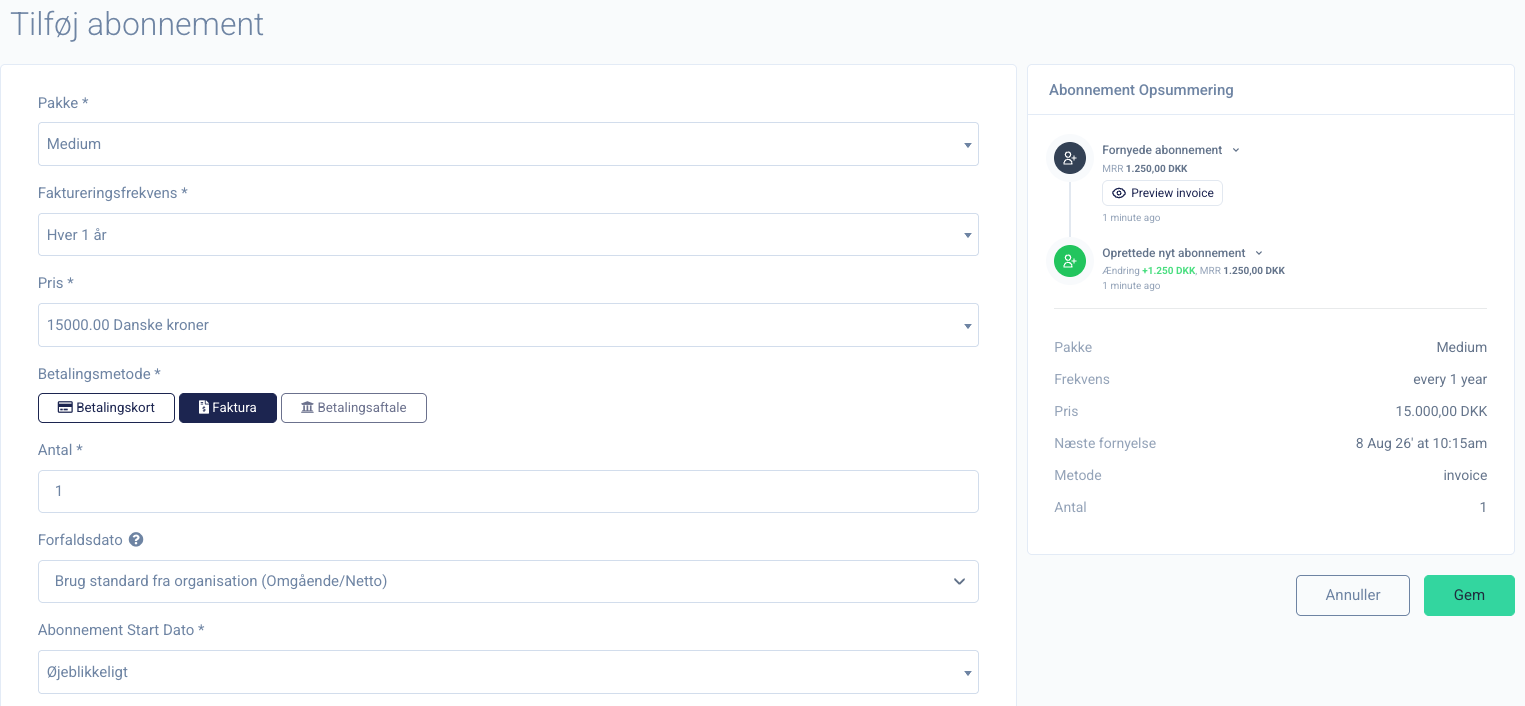
Then review advanced settings if something needs to be added to the invoice
- Attention = contact person
- Their reference = customer's reference
- PO number
- Requisition number / case number
- Invoice addition = extra text on the invoice line
- Invoice issued = when should the invoice be sent relative to the start date
- Custom price = here you can override the standard price without giving a discount
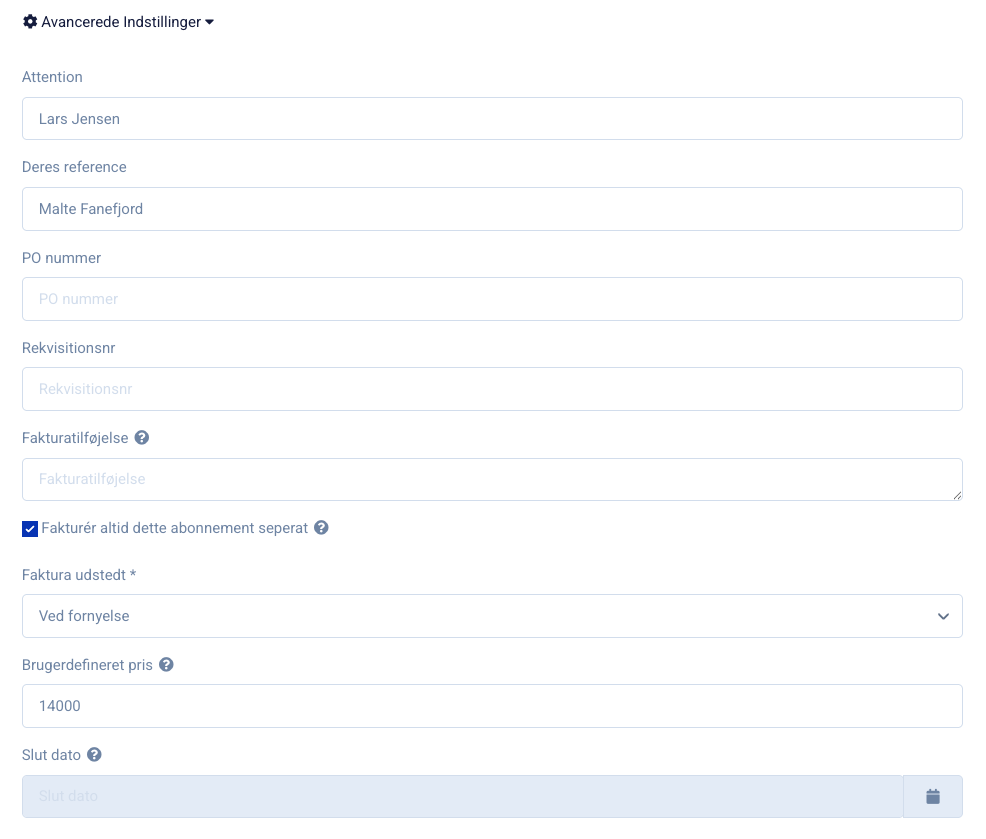
Before clicking SAVE, it's a good idea to look at the invoice in the preview function and see if everything looks correct.
Then the subscription is created and an invoice is automatically sent to the customer at the start time and for future renewals.
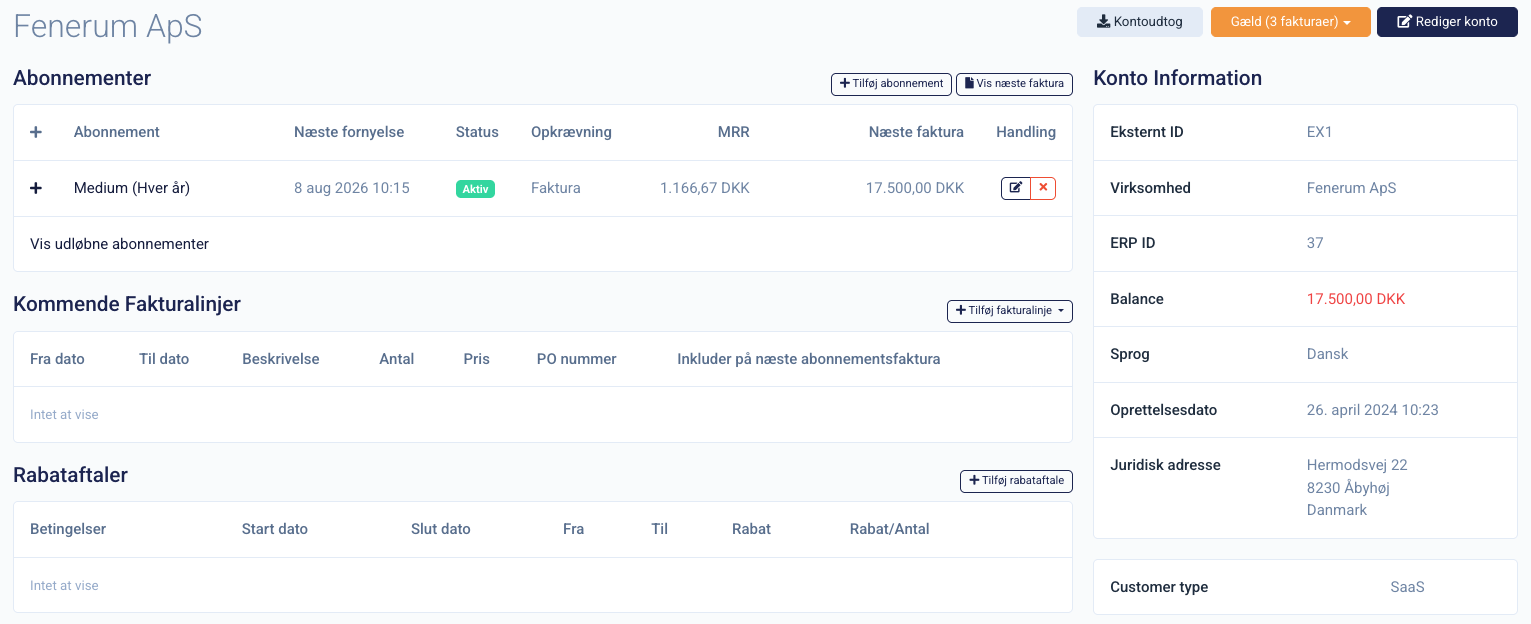
Group subscriptions
In Fenerum, you have the option to consolidate multiple subscriptions onto a single invoice if desired. This can be beneficial for both you and your customers as it reduces the number of invoices and simplifies the payment process.
To ensure that subscriptions are invoiced together, a set of criteria must be met.
1. Disable individual invoicing
- Navigate to the subscription you want to include in a consolidated invoice.
- Under "Advanced Settings," make sure the "Always invoice this subscription separately" option is turned off.

2. Ensure consistent billing details
For subscriptions to be invoiced together, the following billing details must be identical:
- Renewal Date: Subscriptions must have the same renewal date.
- Currency: All subscriptions must be billed in the same currency.
- Payment Terms: The same payment terms must apply to all subscriptions.
- Collection Method: The same payment method must be used.
- Pre-Renewal Invoicing Configuration: Billing settings must be consistent.
- PO Number: If a PO number is required, it must be identical for all subscriptions.
Grouping example
If a customer has three subscriptions with the same currency, renewal date, payment terms, payment method, and PO number, and all subscriptions have individual invoicing disabled, they will be grouped into a single invoice.
If just one of these criteria differs, the subscription will be invoiced separately.
To ensure that the subscriptions appear on the same invoice, you can click "Preview Next Invoice". Alternatively, if a color mark appears on the left side, it also indicates that the subscriptions will be invoiced together, as shown in the image below. 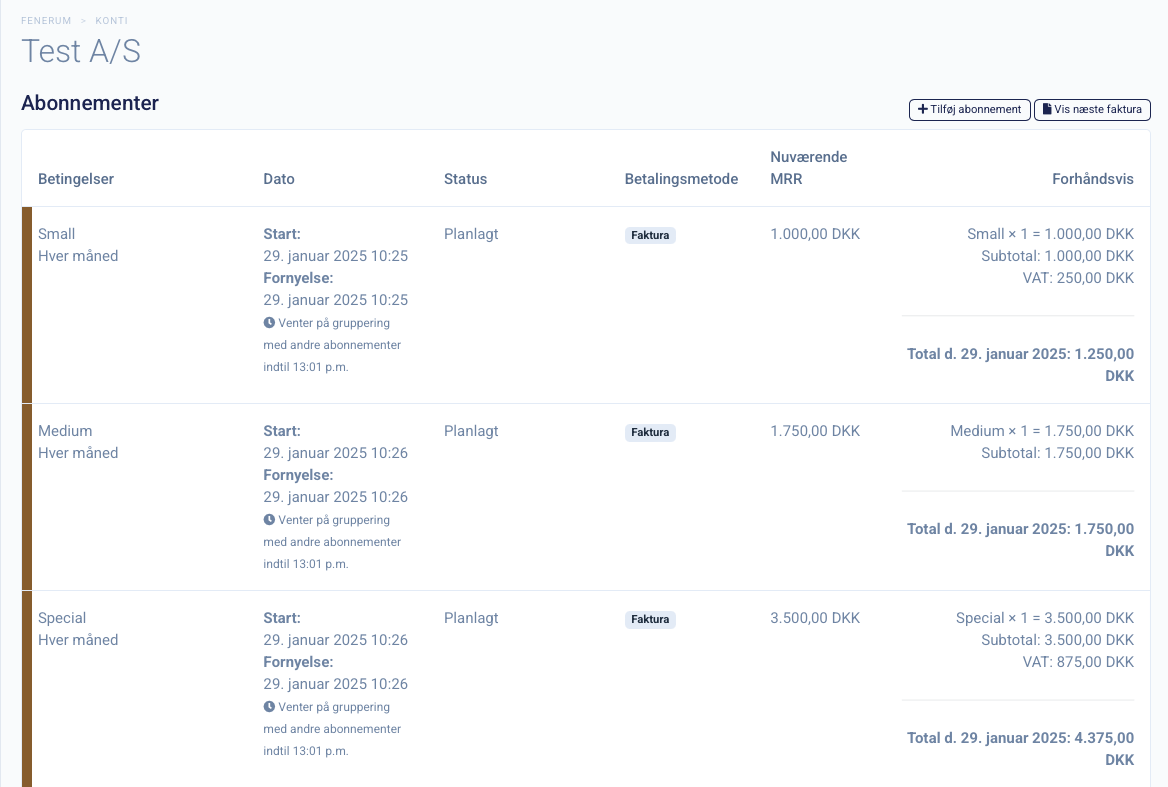
FAQ
Will the system generate invoices for previous periods if I create a subscription with a start date in the past?
Yes, if you create a subscription with a start date in the past, the system will generate all invoices from the start date up until now. Example: You create a monthly subscription on February 15, 2025, but set the start date to February 15, 2023. The system will then generate invoices for each month from February 2023 until now.
